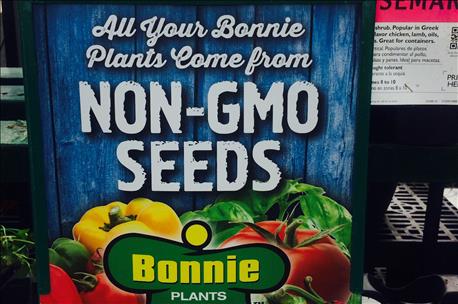
Being from Michigan, I've come to not only anticipate, but also expect to have balmy sunshine and snowflakes in the same week. And sure enough, this year did not disappoint. But as green started to engulf the countryside, I decided it was time to purchase plants again this year.
I placed an order for some hanging baskets. I also picked up some annuals for my beds out front, as well as about a dozen tomato plants that I always have great, but unfilled, hopes for.
This beats all
That's when I saw this large sign (below) hanging above: "All your Bonnie Plants come from non-GMO seeds."

"By tacking on the non-GMO label and proudly marketing it at the retail level, its motive seems to be to convince the buyer that other vegetable plants not carrying the Bonnie name will produce GMO crops."
Really? Have we gone that far? What's next? I can see it now, the organic label won't be enough — "Choice, USDA Inspected, Non-GMO Pork Chop."
This country's newfound love of wholesome, homegrown foods has been paralleled by distaste of GMOs, even though most people don't even know what it stands for or what it means. Because we have such consumer ignorance, Bonnie Plants has decided to capitalize on the prospect, further appealing to the all-natural consumer with a green thumb.
Related: Common Sense Must Rule GMO Labeling Controversy – Commentary
Its advertising is not false or inaccurate. However, at a time when there's great discussion over labeling, this is one instance when it is completely unnecessary and misleading and confusing at best. As most farmers already know, there are no GMO vegetable plants for sale to garden growers. So the need to advertise this distinction seems futile, until you factor in growing consumer suspicions about food — and now the plants that are responsible.
By tacking on the non-GMO label and proudly marketing it at the retail level, its motive seems to be to convince the buyer that other vegetable plants not carrying the Bonnie name will produce GMO crops. It's a deduction by default. And to be fair, Burpee and other seed companies use the same tactic.
~~~PAGE_BREAK_HERE~~~
Never mind that all vegetable seeds have and continue to be non-GMO crops. GMO vegetable seeds do not exist and are not available to backyard gardeners.
There are only eight crops commercially available as GMOs: corn, soybeans, papaya, cotton, squash, canola, alfalfa and sugarbeets. GMO squash isn't available for the backyard gardener — only on a commercial scale.
A pepper plant or seed packet marked non-GMO is labeled as such because you can't grow or buy it any other way.
I'm not even going to bring into question whether non-GMO foods or seeds are better for you. Let's leave that one entirely out of the equation.
Related: A Sweet Corn Conversation On GMOs
I wanted to know if this labeling has altered perception — one that otherwise would not even be in play. I showed the photo on the first page of this story to a group of my nonfarming friends and asked what it meant to them. No one was able to tell me what GMO stood for — not as uncommon as we'd like to believe. It was the group's understanding that GMO crops were somehow altered and were bad for you —or at least not as good as non-GMO crops.
Misleading consumers
The group deduced that seeds labeled non-GMO seeds would probably be better than those not identified as non-GMO, and they would prefer to put non-GMO vegetables into their bodies.
For that, I say shame on you seed companies. Garden-grown vegetables are not GMO crops and never have been. By labeling vegetable seeds as non-GMO, it has opened a whole new crop debate that shouldn't even be on the table. It's created an artificial divide that only confuses consumers more.
Are you interested in the GMO discussion? Penton Editor Holly Spangler has explored GMO foods, GMO labeling and the general genetically modified food debate in an exclusive series. Follow the links below for more.
Would GM Label Ensure Food Safety?
GM Labeling: Dollars Make a Difference
GMOs: The Fight To Label
Urban Moms on GMOs
About the Author(s)
You May Also Like






